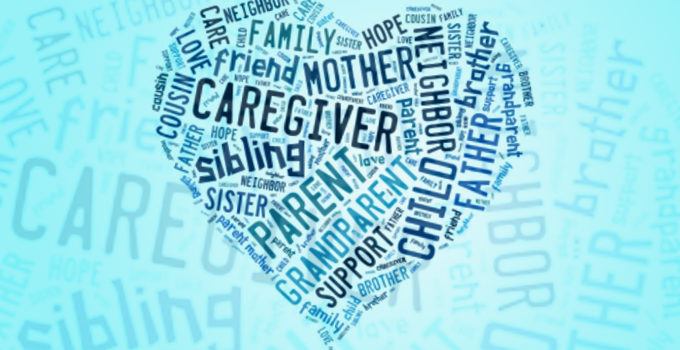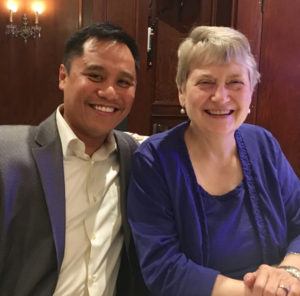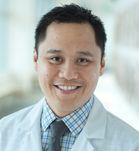

New Program for Family Caregivers
by Marlon Saria
Caregiver [kair-giv-er] noun
- All staff members across Providence Health and Services and its affiliates
- An individual who provides direct care to relatives or friends who are unable to provide for themselves
Cancer is a family disease. No, I am not referring to the small percentage of cancers that can be passed on from one generation to the next—that is another topic that requires a different blog. What I mean is that a diagnosis of cancer affects the whole family.
While there are aspects of cancer caregiving that can be compared with caregiving for other diagnoses, including older adults, special needs children, Alzheimer’s disease and dementia, the cancer caregiving experience can also be different. Life with cancer throws the patient and the family on the proverbial roller coaster ride, where the clinical course is marked by active disease, followed by remission, interrupted by recurrence or metastasis or a new disease, and jumping back into remission. Every course is different, and everyone’s response will be different.
As the Director of the Center for Quality and Outcomes Research (CQOR) in the Department of Neurosciences and Neurotherapeutics, Saint John’s Cancer Institute, Pacific Neurosciences Institute and Providence Saint John’s Health Center, I am faced with these realities on a daily basis. Our clinical team at the Pacific Brain Tumor Center works closely not only with the patient but their families as well.

Linda M. Gorman, RN, MN, PMHCNS-BC, CHPN, FPCN, OCN, was one of my clinical rotation mentors at Cedars-Sinai Medical Center in 2003. She is a renowned nurse clinician and author who has written books on palliative care and caregiving. Linda took on the role of caregiver in a non-cancer setting for her husband when he became ill. I met her recently after not having seen her for over 12 years, “Caregiving is the hardest thing I have ever done,” she said. “It doesn’t matter how much you know. It just hits you.”
On managing multiple responsibilities, one caregiver from UC San Diego told me, “Whatever they told you about juggling multiple balls and dropping self-care is not true. That ball does not get dropped. It does not get picked up in the first place.”
With the cancer experience, the patient is the focus of care. While numerous programs exist to manage the effects on patients—and rightfully so—few approaches have been launched to support caregivers, whose overall health is critical to the treatment and recovery of patients diagnosed with cancer.
A study published through our research efforts at Saint John’s Cancer Institute and Pacific Neuroscience Institute and colleagues from UC San Diego and UCLA describes the link between mood disorders and caregiving for patients with brain metastases. The findings themselves are not earth-shattering. There are numerous scientific reports that describe the negative results. What is more remarkable is that the needs of family caregivers are often not addressed. This has been acknowledged by the National Academies of Sciences, Engineering and Medicine in their 2016 report, Families Caring for an Aging America (referred to in a previous blog article). While the report emphasized caregivers of older adults, the recommendations can be applied to all conditions. The report provides a clearer direction for healthcare professionals and researchers to strengthen America’s family caregivers.

We are committed to taking on the challenge caring for America’s caregivers. With the full support of Dr. Santosh Kesari, Chair of the Department of Neurosciences and Neurotherapeutics, a team of Providence caregivers and myself, we are launching the Family Caregiver Program that will start with a comprehensive assessment of the family caregiver burden. So far, the program stretches across Providence Saint John’s Health Center in Santa Monica, Providence St. Joseph Medical Center in Burbank and Providence Holy Cross Medical Center in Mission Hills, CA.
Assessing family caregiver strain and burden is the first step toward managing the problem that is often unintentionally neglected in the provision of cancer care. And as I have said—cancer is a family disease.
About the Author

Marlon Saria
Marlon Garzo Saria, PhD, RN, AOCNS, FAAN, is an oncology clinical nurse specialist and nurse scientist for the Inpatient Oncology and Caritas concierge suites at Providence Saint John’s Health Center in Santa Monica, California. He is an Assistant Professor of Neurosciences and Neurotherapeutics and Director of the Center for Quality Outcomes and Research at Pacific Neuroscience Institute and Saint John’s Cancer Institute. Dr. Saria serves in the Nurse Corps of the U.S. Air Force Reserve as a flight commander in the Aerospace Medical Squadron. He was inducted as a Fellow of the American Academy of Nursing in 2014.
Last updated: July 29th, 2020